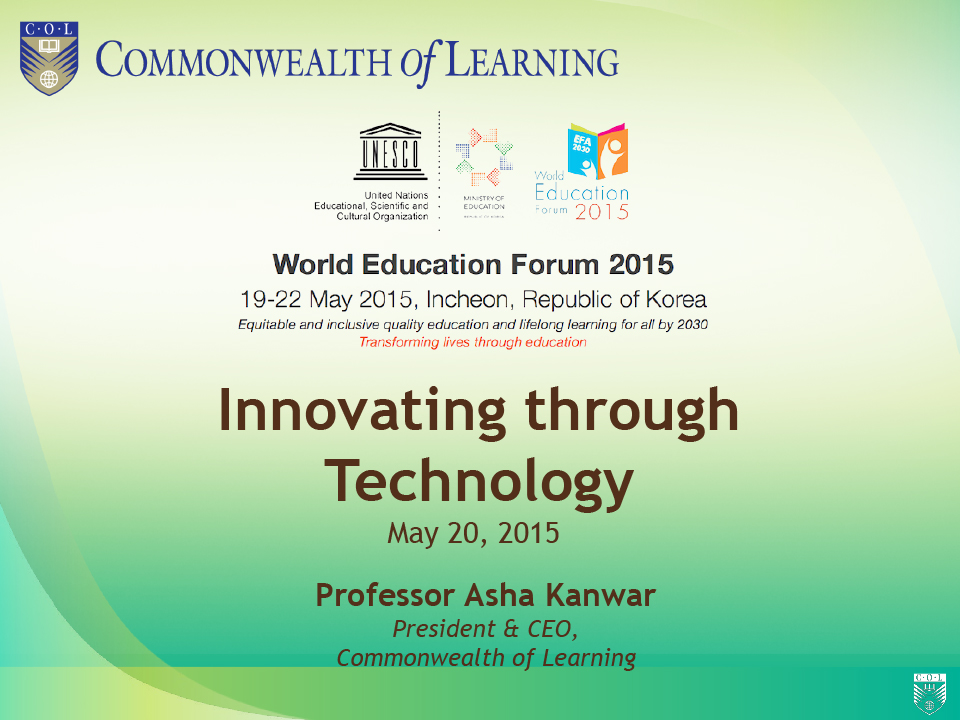
I’ll share some examples of how my organization the Commonwealth of Learning or COL is innovating through the use of technology and the lessons learned.
The Commonwealth of Learning is an intergovernmental organization whose mission is to promote learning that leads to development.
The 53 member states in the Commonwealth span all regions of the globe—46 are developing countries with several challenges relating to education and learning.
Let me just take three challenges or the 3 ‘Cs’ relating to content, capacity and connectivity and what COL has done to address these.
COL established a six-country partnership to develop 20 sets of course materials in print and online formats, based on the secondary curricula of Botswana, Lesotho, Namibia, Seychelles, Trinidad & Tobago and Zambia. The materials have been developed as Open Education Resources (OER), so that without duplicating effort, participating countries can have access to quality materials that they can adopt and adapt as necessary.
COL’s Virtual University for Small States of the Commonwealth (VUSSC), a consortium of institutions from all 31 small states of the Commonwealth have developed needs-based courses which are freely available, as OER.
COL has developed a prototype for open textbooks through the use of OER and this is being piloted by Antigua and Barbuda, to be taken up by the other OECS countries.
The UKOU Research Hub conducted a survey to assess the use of OER by formal learners in India, the small states of the Commonwealth and the Open Learn UK. Students in developing countries showed high levels of satisfaction with OER in terms of increased interest, better collaboration with peers and improved grades.
OER emerged as a technology driven solution to address issues of costs and quality. But the lesson we have learned is not to view OER as a product but as a process that involves and empowers stakeholders into becoming active producers rather than simple consumers of content.
Let us take up the second C: capacity.
These women from our Lifelong Learning for Farmers project used basic mobile phones to learn about goat enterprise from experts in their own language. The majority of women owned their own cell phones, and this ownership was a critical factor in helping them to domesticate this technology.
Olivia Atieno from Kenya is a school dropout and the only breadwinner in a large family. Through her participation in L3F, during which she learns daily using her mobile phone, she has become an active member of a cooperative, accessed credit and increased both her productivity and income.
COL has been harnessing the potential of Massive Open Online Courses or MOOCs to scale up capacity building. In partnership with IIT-Kanpur, COL offered a MOOC for malis or gardeners early this year and this was delivered through basic mobile phones in Hindi, the national language.
What was the innovation here? COL’s L3F placed the mobile within a specific social context, used strategies to facilitate the domestication of the technology, built capacity through learning and networking that resulted in the social and economic empowerment of stakeholders.
Finally, how do we address the challenge of connectivity and reach the unreached?
How can we reach students under this tree with quality learning materials?
Aptus or the Classroom Without Walls is one possible solution. It is developed using readily available and low cost components and costs less than $ 100. Aptus does not require power from the mains. We can use solar chargers instead. It does not require any connectivity. We use a wireless router. All this enables teachers and students to access good quality digital materials through this device. As of now, learners can access the Wikipedia for schools containing over 6000 articles. Or the 2000 Khan Academy videos, covering topics relevant to learners in primary schools or high schools. A whole library of free books is also available. In addition, teachers can develop and upload their own content.
This has been deployed in small island states and here you can see the Hon Minister of Education, Vanuatu presenting it to his officials.
The innovation in this case is that the emphasis is on the people rather than the technology and learning is seen as a process of knowledge creation.
In conclusion, our experience shows that technology by itself does not lead to innovation. Innovation happens when technology is placed in an appropriate social economic and political context and the stakeholder is empowered to domesticate the technology.
Thank you for your kind attention.


